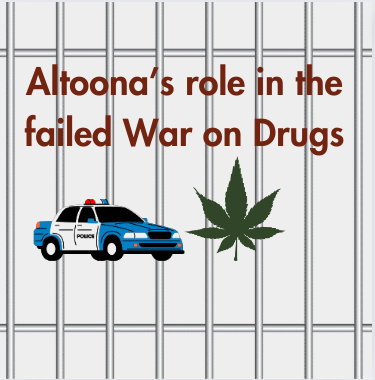On Thursday May 16, the Justice Department formally moved to reclassify marijuana under the Controlled Substances Act from a Schedule I drug, the most dangerous type to a less serious classification level. Since 1970 cannabis has been put in the same category as heroin, LSD, and ecstasy- just to name a few.
Much, if not all, of the reason for why weed has such a stigma and is illegal on the federal level is due to racism. Same goes for really the entirety of the war on drugs that was spearheaded by none other than Altoona native Harry J. Anslinger, also known as the “tzar of the war on drugs”.
Anslinger’s parents, Robert and Rosa Christia immigrated from Switzerland. Not too much is known about his mother. His father was a barber over in Switzerland who immigrated to the U.S. in order to avoid having to serve in the Swiss Army. When they first arrived in New York, both loathed urban life, so Robert got a job in Altoona working for the Pennsylvania Railroad. Soon after, they had nine children, Harry being born eighth in 1892. Since the family was poor, Harry too had to work for the PRR all while going to school in the morning.
Throughout his formative years, narcotics were already making a great impression on Harry. According to Harry’s 1961 book The Murderers one of the most impactful moments in his crusade against drugs (his code for people of color and hippies) was hearing the screams of a neighbor woman. Her husband then sent 12 year old Harry to the drugstore to pick up a package of morphine. The pharmacist gave Harry the potent drugs without question.
In order to pursue his crusade against drugs, Harry knew he had to get a formal education. So in 1913, the railroad granted him furlough, and he enrolled in a two-year associate-degree program. A year into his studies, the first measure to regulate drugs was enacted with the Harrison Narcotics Tax Act that mandated narcotics manufacturers, distributors and sellers to disclose and register with the federal government, plus pay a small tax.
Following his studies at Penn State, Harry rejoined the railroad- this time as a detective. After getting the company out of a $50,000 negligence suit, he was promoted to the captain of the railroad police. This formally began Harry’s lifelong crusade of being just an absolute villain.
Towards the end of World War I, Harry served overseas with the State Department to gather intel on Kaiser Wilhelm among other high ranking German officials. Eventually, Harry got to live out his fantasy of being a drug buster when he was stationed in the Bahamas to hunt down rum-runners throughout Prohibition. Finally, by the late 1920s it was realized that Prohibition was failing miserably, furthermore the Prohibition Bureau had widespread corruption and desperately needed to be restructured. In came a Pennsylvania congressman who in good faith introduced a bill to separate liquor and drug enforcement. Just eight weeks after Anslinger was named acting commissioner of the Federal Bureau of Narcotics in 1930 his position became permanent by Herbert Hoover.
As soon as Anslinger stepped into his role, he focused almost entirely on marijuana due to his deeply seeded racist, xenophobic and reactionary beliefs. At the time, most of the weed in the U.S. was coming from Mexico. This drug was foreign, and therefore super scary, so most of the anti-weed propaganda promoted by the DEA did not use the drug’s formal name (cannabis), instead it would use marijuana to further stoke fears about its “mexican-ness”. This is also why and when the term marijuana came into popular usage in the U.S. Additionally, Harry began to compile inflammatory and highly dramatized headlines to put in his “Gore Files.” This collection included one headline from the New York Times that said “Mexican Family Go Insane,” the story was about a young widow and her four children who in starving desperation ate a marihuana plant. The article (and Harry) claimed that this doomed the kids to certain death and the mother would endure a life of dementia.
Another way Anslinger would promote his racist policies was through literally targeting Billie Holliday among other prominent black jazz musicians of the time. In official ad campaigns, memos and press briefings he would insult black celebrities using violent racist language while never even mentioning white celebrities who did the same things. Surprisingly, after one particularly egregious racist remark, some called for his resignation, but he continued to work until he was required to retire from federal employment in 1962. On August 8th of that year the people of Hollidaysburg held the “Harry J. Anslinger Day”.
What Anslinger did at his time heading the DEA laid the groundwork for the war on drugs that formally began with Nixon in 1971. This disastrous and insensible war has caused mass incarceration to skyrocket in America, especially for black people even though no evidence supports that black Americans use or distribute illegal drugs at an increased rate. Anslinger, although evil, was not the grand mastermind of systemic racism, but he undoubtedly was a major contributor. When we think of who contributed most to the issues we see today, we tend to assume that our area has no ties whatsoever to them- this should no longer be the case. We also tend to foolishly think that issues pertaining to race are something that only the south contributed to, but to break them down we must examine the whole nation’s role in upholding these systems of oppression.









